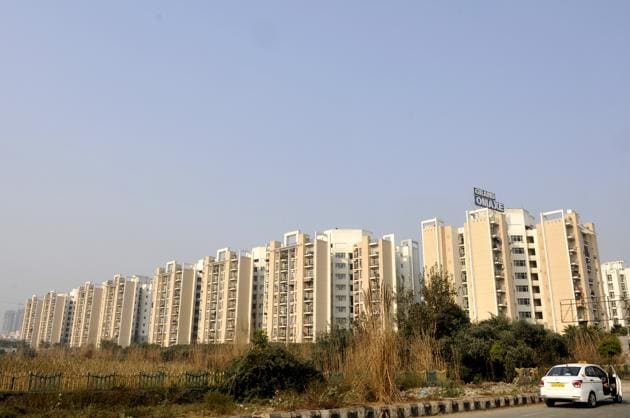Property prices fell after note ban, likely to go down further, says economic survey
Real estate prices declined as cash shortages impeded property transactions, says the survey.
Real estate prices have fallen following the demonetisation move and are likely to go down further as investing undeclared income in real estate will become difficult, says the Economic Survey.

One of the aims of demonetisation was bringing down real estate prices, chief economic adviser Arvind Subramanian said after the economic survey was tabled in Parliament.
The survey called the Goods and Services Tax (GST) a bold new experiment and pitched for including land and other immovable property - the key source of black money creation - in the indirect tax regime to help propel GDP growth to 8% to10%. Individual income tax rates and real estate stamp duties should also be reduced, it said.
It also said that there was a need to establish a centralised Public Sector Asset Rehabilitation Agency (PARA) in view of rising bank NPAs and declining credit growth.
Reacting to the Survey, real estate experts said that demonetisation will help reduce cash transactions in the sector and make the industry more transparent. It would also start attracting foreign investment. They also said that to compensate for reduction in property prices, the government will have to push demand for affordable housing through reduced interest subvention schemes and tax waivers for homebuyers. Incentives should be given to developers for constructing affordable housing. “The middle class will get access to affordable housing due to fall in real estate prices,” they said.
“Demonetisation could have a particularly profound impact on the real estate sector,” the economic survey said. On the short-term impact, it said “prices declined, as wealth fell while cash shortages impeded transactions”. About the likely longer-term effect, the pre- Budget document said, “prices could fall further as investing undeclared income in real estate becomes more difficult”.
The tax component could rise, especially if Goods and Services Tax, slated to roll out in July, is imposed on real estate. Much of the black money accumulated was ultimately used to evade taxes on property sales, the survey said, adding that this type of tax evasion will come to an end as curbs on unaccounted wealth get stricter and financial transactions through electronic means increase.
While too early to assess the permanent effects of demonetisation, the survey said the weighted average price of real estate in eight major cities, already on a declining trend, fell further after November 8, 2016. “An equilibrium reduction in real estate prices is desirable as it will lead to affordable housing for the middle class, and facilitate labour mobility across India currently impeded by high and unaffordable rents,” it said.
Commenting on the survey, real estate experts said that cash transactions in the real estate market are expected to come down further following demonetisation. “The economic survey pegs economic growth at 6.75% to 7.5% in 2017-18, which we believe is still a good growth rate. We agree that demonetisation will have long-term benefits, especially for the real estate which sees a lot of cash transactions, especially in the resale market. We believe that over a period of time, cash transactions in the real estate sector will reduce. This will make the industry more transparent and will help the sector in attracting foreign investment. We are also glad that the survey recognises the potential of property tax as a source to generate additional revenue at city level,” says Sachin Sandhir, global managing director – Emerging Business, RICS.
Experts also said that real estate prices have corrected by 10% to 15% after demonetisation and are likely to correct by 5% to 7% after newly enforced Benami Transactions Act, which attracts a heavy penalty and rigorous jail term of a maximum seven years, are put in place.
“Going forward the government will have to compensate for reduction in property prices by pushing demand for affordable housing through reduced interest subvention schemes and tax waivers for homebuyers and providing incentives to developers for constructing affordable housing stock to meet the Affordable Housing for All target by 2022,” says Ravi Ahuja of Colliers India.
(With inputs from PTI)



